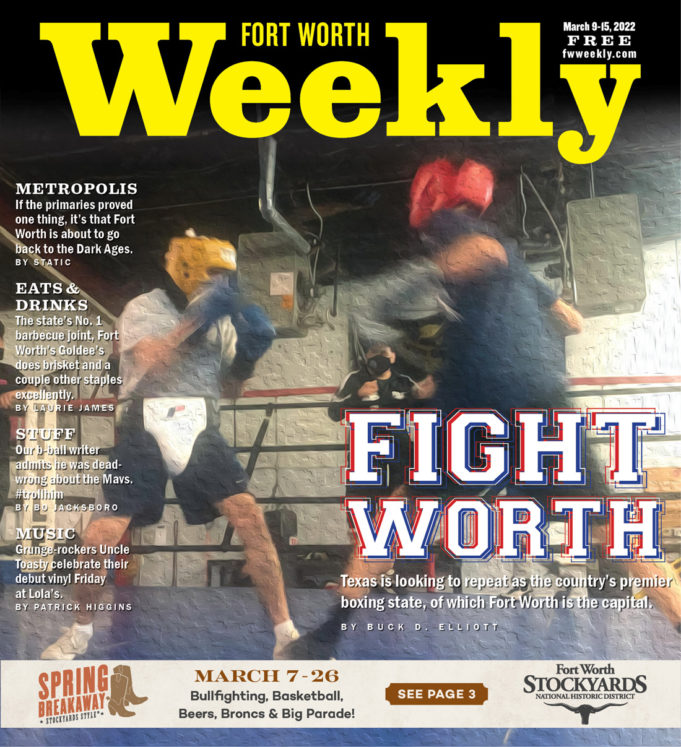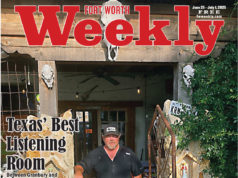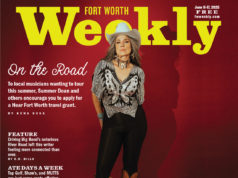In an area most just pass through, should they be headed to the Stockyards, sits an unassuming metal building across a bridge from downtown. Beginning around 5:30 p.m. almost every night, the gravel parking lot becomes dotted with vehicles, and one night not too long ago, a trio of men mixed and mingled outside the iron-gated entrance. One of these men’s hands were immediately noticeable, as they were wrapped in neon-yellow duct tape. Slowly, additional vehicles carrying men, women, and children parked as the sun began to set. At 10 to 6, the doors were unlocked from within, and the amoeba of humanity slowly filtered inside, except a few who were devouring instructions from a gentleman in jeans and a ball cap who emerged from behind the locked gates.
Many at this facility are training for an upcoming boxing tournament, hosted in Fort Worth, the first step in a progression to the national Golden Gloves Tournament of Champions in Tulsa this year. The man outside fervently giving instructions is Joe Guzman. I didn’t know there was such a thing as a walking and talking boxing museum, but Coach Guzman epitomizes a sweet science sage if ever there were such a thing. I arrived at Fort Worth’s lone Golden Gloves gym with a notepad and phone — standard materials in the journalism world — but quickly realized I’d be best served by taking the occasional note while letting the boisterous coach walk the east wall of the gym (which is wallpapered in team photos and castled with trophies) and trying to avoid interrupting him.
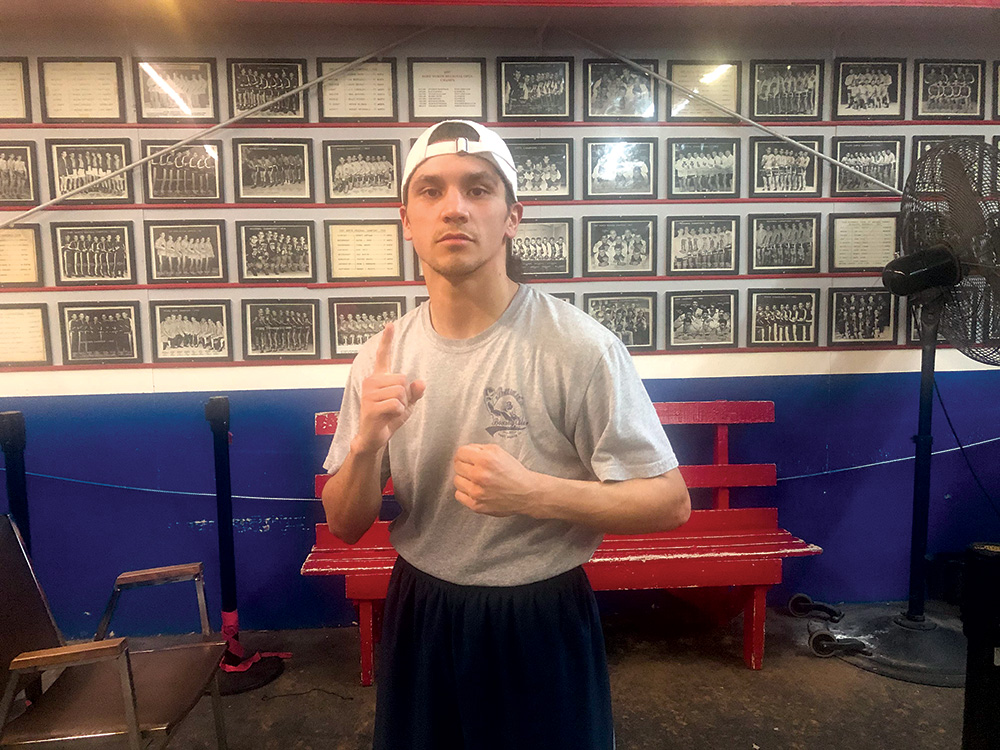
Photo by Buck D. Elliot
If you’re a youngster, or new to the area, you may not know that Cowtown is known for more than cattle and crooked politicians. Fort Worth is the 86-year-old hub of Texas’ Golden Gloves franchise. This 96-year-old nonprofit boxing organization open to anyone encompasses more than 30 franchises nationwide that send teams to a national tournament every year. Texas is easily one of the most successful states. The humble building off Jacksboro Highway is essentially an exhibition of how trophy architecture has evolved over the last century. People are familiar with — at least as a brand name — Golden Gloves. The amateur boxing organization has never adopted another moniker, and that continuity has led to at least name recognition among commonfolk.
Boxing as a spectator sport has experienced ups and downs over the last few decades, and even those who aren’t committed consumers of combat sports are aware of recent superstars like Oscar De La Hoya or Floyd Mayweather. It would be hard to find a Boomer or Gen Xer who doesn’t know of Evander Holyfield, George Foreman — if for nothing more than his personalized grills — or infamous ear biter Mike Tyson. Professional boxing is mostly predicated on long-anticipated fights shown via Pay-Per-View and featuring hand-picked opponents who prepare for one ginormous payday for months at a time. Even Jake Paul — of Vine, Disney Channel, and YouTube fame — is now a major name associated with professional boxing, but amateur boxing is alive and well in Panther City, even if the names aren’t household quite yet, and it’s largely because of Golden Gloves.
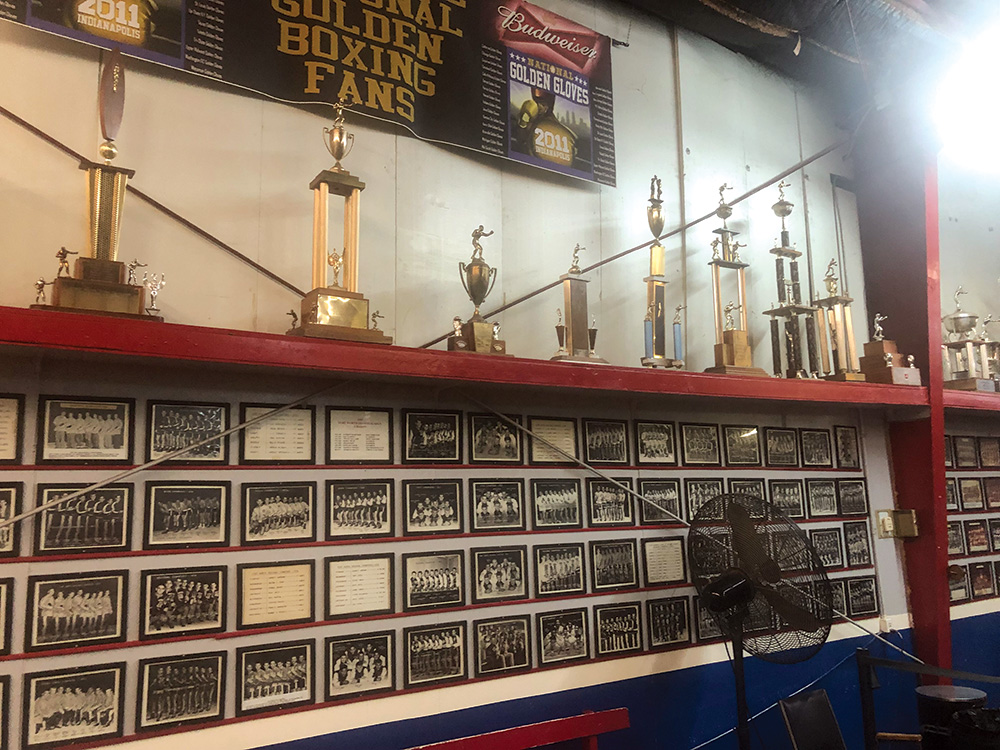
Photo by Buck D. Elliot
Former champions — many of whom started their careers in this gym northwest of downtown (or one similar) — are punching to break into a sport that Fort Worth stakes part of its multifaceted identity on. Donald “Cobra” Curry was the first national world champion from Fort Worth and won the Welterweight division in the early 1980s. Curry’s older brother Bruce Curry — who had been working at the General Motors plant that now houses Martin Sprocket and Gear off McCart Avenue — won the Light Welterweight championship during the same time. The duo represent the only brothers to ever hold concurrent professional world boxing championships. Donald became a member of the U.S. Olympic team, though he was unable compete at the Moscow games because of sanctions — some things never change — and Bruce missed the Montreal games in 1976, losing the spot to “Sugar Ray” Leonard. These brothers had something else in common aside from their blood and dashed Olympics aspirations. They were both Fort Worth Golden Gloves champions.
*****
As a state, Texas is still producing some of the best amateur boxers in the nation, and they’re all — at least in some way — connected via Cowtown. Golden Gloves Fort Worth is the funnel through which all amateurs throughout the Lone Star State will compete nationally for a title. The Fort Worth Regional meet — which runs March 8-12 at Will Rogers Watt Arena — is the first step for fighters from the greater North Texas area who aspire to advance to Golden Gloves champions.
Monica Basan, the president of Texas’ franchise since 2016, is in charge of coordinating travel and accommodations for the coaches and fighters from the Lone Star State, as well as overseeing fundraising. Basan evolved into this position after coming through the iron gates with her oldest son, who was interested in boxing and started training there when he was 9. Twenty-one years later, Basan’s son is now the gym director and coaches along with his brother. Basan’s husband also coaches at the gym and serves as vice president of the Texas franchise, and their daughter helps coordinate whatever tasks are required. As with all official Golden Gloves gyms, the facility is free to use. New boxers can join one of the three clubs that operate regularly, of which Basan’s husband and Guzman run two, or they’re free to bring their own coach and utilize the equipment and space within operating hours. There are quite a few boxing gyms around — some corporately owned, others privately — but there’s never any fee associated with a Golden Gloves gym. The coaches are volunteers, and during the course of an evening practice, you’re likely to see 8- to 45-year-olds of all skill levels. Junior Chavez, an assistant coach, told me it generally takes someone between four and six weeks to figure out if the sport is for them or not.
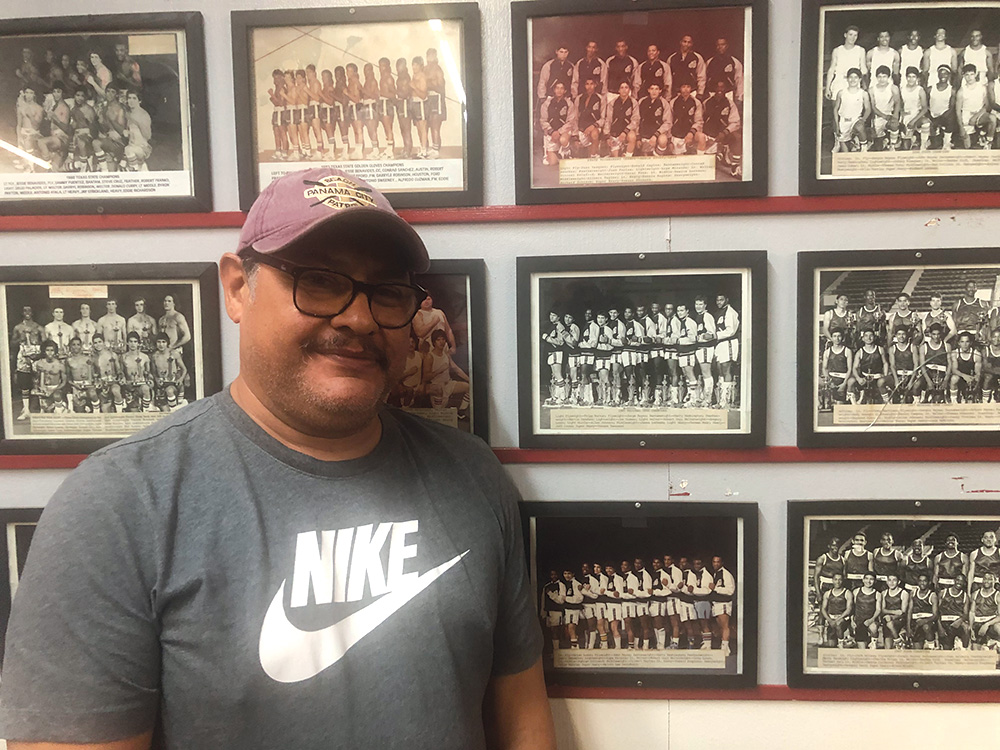
Photo by Buck D. Elliot
“Your test is in here, and it’s gonna hurt if you fail,” Guzman said, pointing at the sparring ring whose footprint eats up half of the building’s square footage.
Guzman has coached for the Texas team at nationals since 2013 and emphasized the trust he builds among successful fighters. The essential characteristic in one of his fighters, according to him, is openness in all facets.
“If you listen out here,” he said, “you’ll listen in there.”
When asked why he thought the teams from Texas had been so successful, he lauded their maturity and focus, stressing that it couldn’t be taught but that it is necessary for the coach to tap into. To advance, all boxers who appear at the national tournament will have won their regional and state meets, which are multi-day events. Fighters compete tournament-style in a draw along with others in the same weight class and gender. While Masters and Juniors are present at the regional and state fights, the focus is on those between the ages of 18 and 40 (which are the age cutoffs for nationals), and there are no differentiations between ages.
“They’re really fighting their buts off,” said Basan while explaining the long progression an athlete endures to reach the champions tournament. Fights are Olympic-style, which means they’re three three-minute rounds to show the judges what they can do, and it’s impossible to prepare for one specific style of match or opponent like a prize fighter will.
Like most gifted amateur athletes, their primary goals are to become professionals and be paid. Alexis Mones is in limbo toward that process. In 2019, the first year she advanced from state, Mones won the 119-pound weight class along with a coveted title. She represents the first time a Fort Worth-based fighter had won a national Golden Gloves title in 31 years. In 2021 (after the meet was canceled due to COVID in 2020), she repeated as champion and was joined by German Lopen, who won the men’s 125-pound weight class and is also local to Fort Worth. Mones offered some insight into the challenges of amateur fighting compared to the professional boxing we consume on television: “You’re having to make weight every single day of a tournament.”
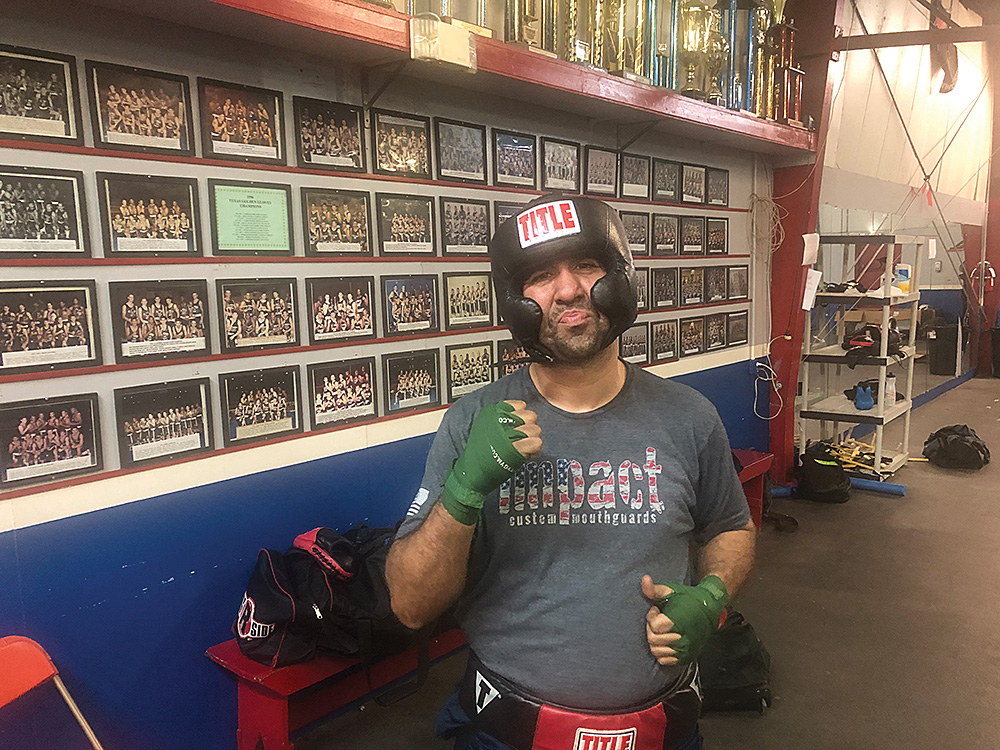
Photo by Buck D. Elliot
Golden Gloves fighters don’t generally train at the weight they compete at. They cut down to weigh in and fight in a slightly lower class than what they’d generally be, which is something professional fighters do but at a much lower frequency.
“I was a lot smaller in the 125-pound weight class,” said Mones, who had advanced to state in the heavier class in 2018 but couldn’t win that tournament until deciding to commit to fighting in the lighter class. “I felt like I could just hit them with the kitchen sink, and they would keep coming,” she said while patting her head and recounting her difficulties before dropping to the lighter division en route to her first championship.
Mones started boxing at 23. Now a 31-year-old mother of two, the Trimble Tech graduate who always played sports said wrestling in high school worked to ingratiate her to and stoke her appetite for combat sports.
“I just wanted to get back in shape — I kind of like violence,” she said, laughing that she always enjoyed watching mixed martial arts and the like but knew better than to ever do anything to land her in trouble in her normal life. A native of San Jose, Mones moved to Fort Worth when she was 8 and considers herself a Texan, admitting her Left Coast family chides her about her accent while on trips to visit them. After becoming a two-time champion, Mones — who is a leasing agent day-to-day — was supposed to make her professional debut on a fight card in Mesquite last summer, but the contest was canceled. Still technically an amateur, Mones hadn’t yet decided if she would return for the regional Golden Gloves tournament this week to try to win another title, citing how hard it is on your body to make weight so many days in a row and admitting how hard it is on people to miss work.
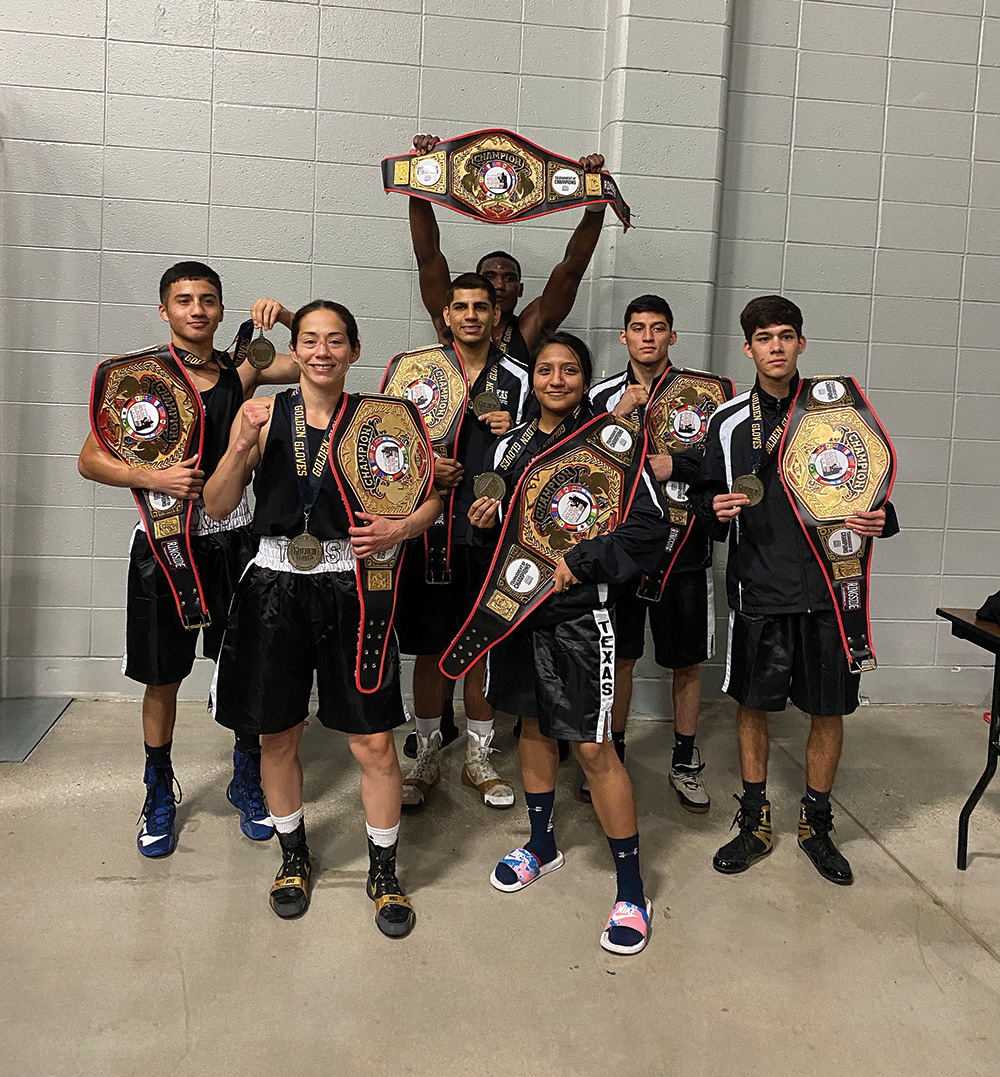
Courtesy Monica Basan
All travel, lodging, and per diems are covered by the Golden Gloves organization, but there’s no way for these amateurs to recoup missed wages from their day jobs as simply attending the final tournament is a nine-day trip. In addition to the support of Golden Gloves staff like Basan and Guzman, Mones applauded Cowtown’s resident historian and philanthropist Larry O’Neal, who has helped her and other fighters generate income by supporting fundraising campaigns for them to attend other tournaments where lodging and expenses aren’t covered. O’Neal, Mones said, organizes meetings at Ol’ South Pancake House on South University Drive where former world champions like Curry will attend and meet with veteran and upstart boxers to network and fellowship together.
*****
Following this week’s regional, the weight-class champions from the sub-franchise regionals throughout Texas will then return to Will Rogers March 16-19 for the state meet to determine which fighters will comprise the team of Texas at the national tournament in Tulsa in mid-August. Coach Guzman will be the default man in the corner of every fighter with “Texas” embossed on their uniform. Individual coaches from qualifiers are welcome to attend. Some are able to, while others aren’t.
Team Texas is a force as it pertains to national titles and total points at nationals (which a team receives for champions or fighters advancing deep into the tournament in their respective weight class). As a team, last year was historic for Texas. Of the state’s 13 fighters (nine men and four women), seven returned as Golden Gloves champions — including Mones and Lopen — along with the team title. Texas’ margin of victory ahead of the second-place squad was greater than any Basan could find a record of. In comparison, Texas won the franchise title in the 2019 nationals but crowned only two individual champions, of which Mones was one.
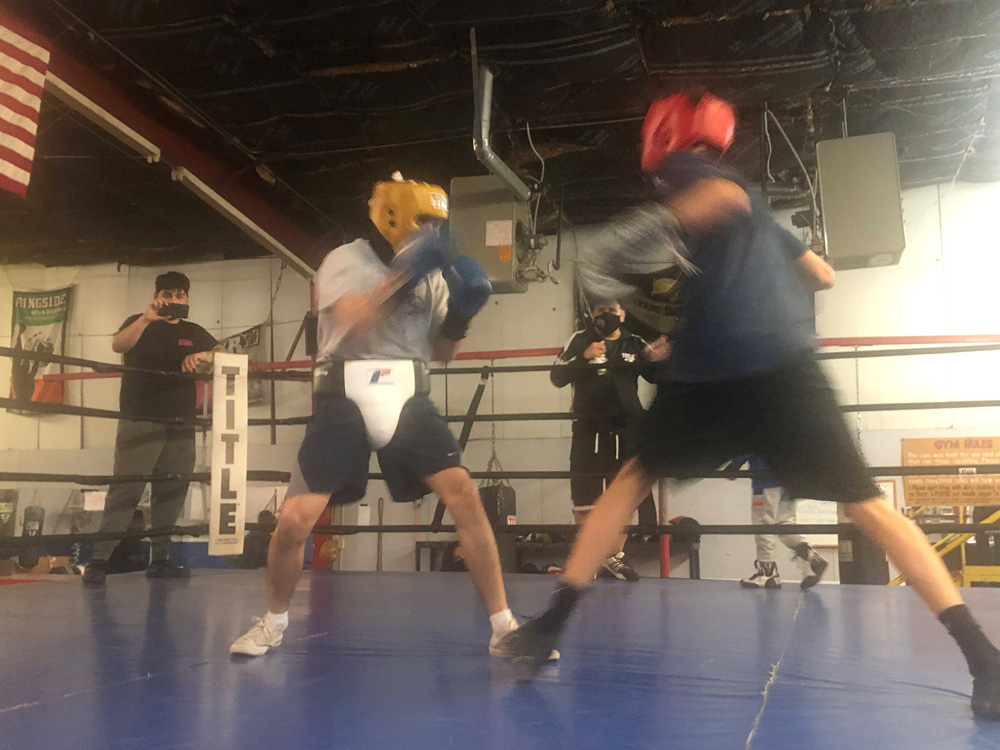
Other franchises “hate when they see Texas coming, because it’s going to be a hard fight,” Guzman said of the atmosphere surrounding the squad at nationals. The team championship has returned to the Jacksboro Highway facility four times in the past eight years. They’ve also finished third place twice during that span.
Guzman, who is known to wear jeans and boots during the national meet, is as confident as they come. Now a Haltom City resident, Guzman was a Golden Gloves fighter in his youth along with brother Freddie Guzman, who became a professional boxer. Joe, never going pro himself, worked 20 years for Waste Management and is now a partially retired father of two and grandfather to eight. Loquacious in nature, the coach recounted national meets and his exploits, including a verbal altercation with boxing superstar Floyd Mayweather after the Diamond Hill-Jarvis graduate mistakenly called him “Roger” when the team was visiting Mayweather’s gym while in Las Vegas during that year’s meet. Coach Guzman admits that he regularly keeps the team waiting outside during the national commissioner’s opening talk to the coaches and their fighters so he can march in with his squad and intimidate the other teams. “It’s just a little psychological warfare.”
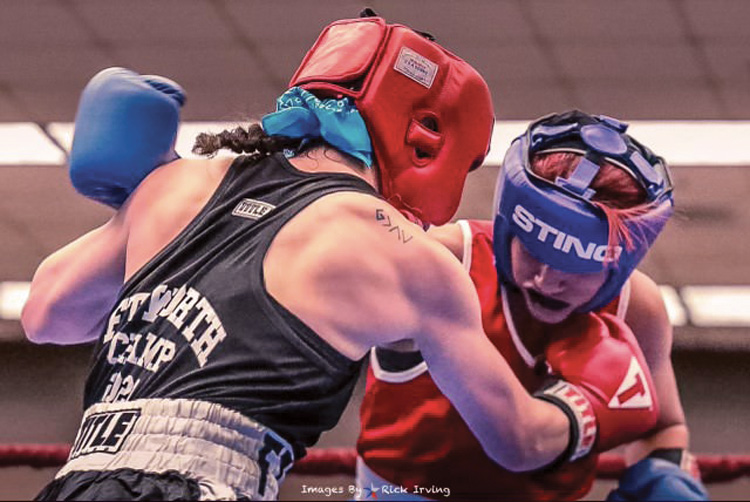
Courtesy Rick Irving
One of Guzman’s grandsons, Isaiah Blanco, is only 13 but approaching 6 feet tall and is preparing for a junior national tournament this summer. Blanco spent part of that night’s practice sparring with David Anguiano, a 22-year-old Northside High School grad who works downtown at the Omni Hotel. Anguiano, now father to his first child, hasn’t fought since losing in the 2017 regional meet. He said that he’s all-in on pursuing a Golden Gloves title now and that his daughter has provided the motivation for him to win his battles outside the gym and pursue boxing professionally. When asked if he would continue based on success this year, Anguiano unequivocally replied that he would — “that’s all I know,” referencing Rocky Balboa.
Not everyone training at the gym is homegrown or a youngster hoping to make their name as professionals. Roberto Casas will be fighting in Golden Gloves’ Masters division. The 41-year-old tire mechanic and server is a transplant from Chicago who moved to Fort Worth because the cost of living was more reasonable and he has family in the Houston area. Guzman was quick to tell me that a man of Casas’ age doesn’t listen very well because they’re already set in their ways and are much tougher to coach. Casas confirmed as much but is trying to improve his adaptability after starting to box only three years ago. The Masters athlete won the Atlanta Open and is hoping for continued success this week.
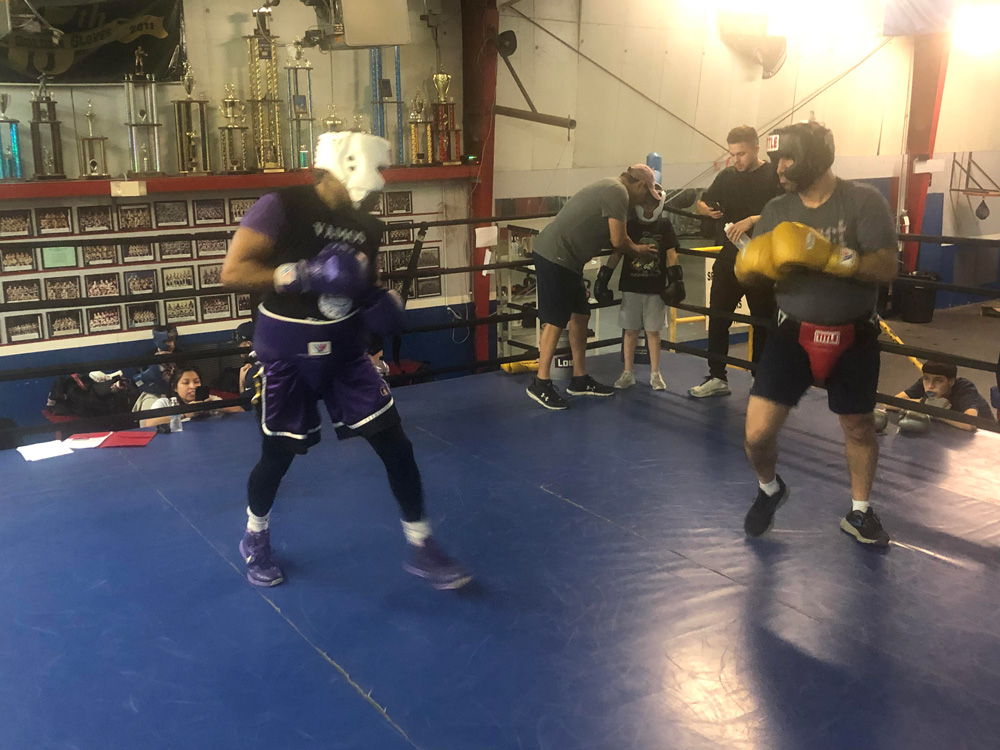
Fort Worth’s lineage with boxing is long and storied, encompassing a spectrum of great professional and amateur fighters. While Panther City may not be regarded nationally as a fount of premier boxers — we haven’t erected a statue of a fictitious fighter in our downtown like Philadelphia did — there is no doubt that the Fort is still producing great fights and fighters in a sport that is not down for the count and is an important part of a history that is still being written.



